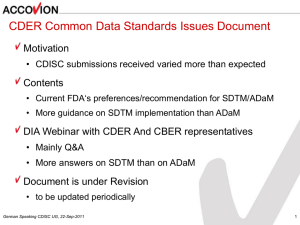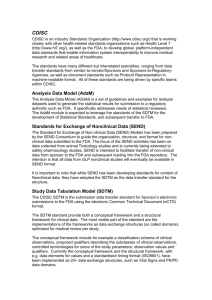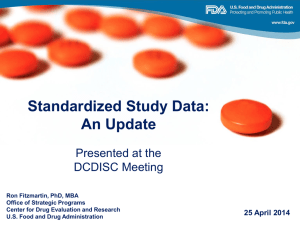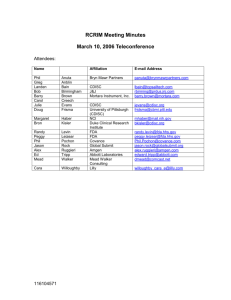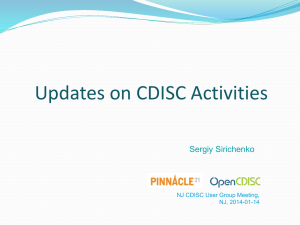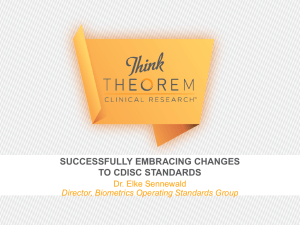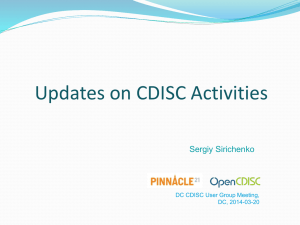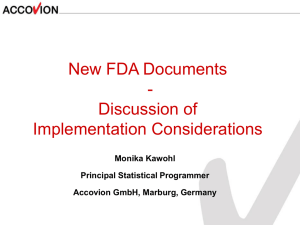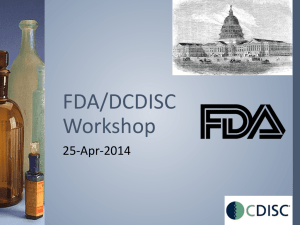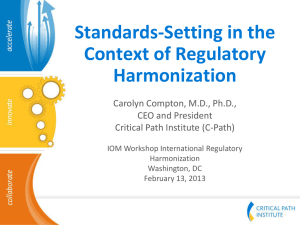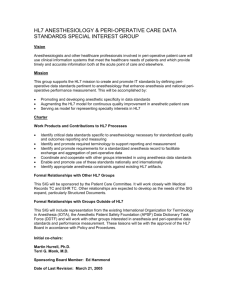CDISC-HL7 Study Data Standards
advertisement
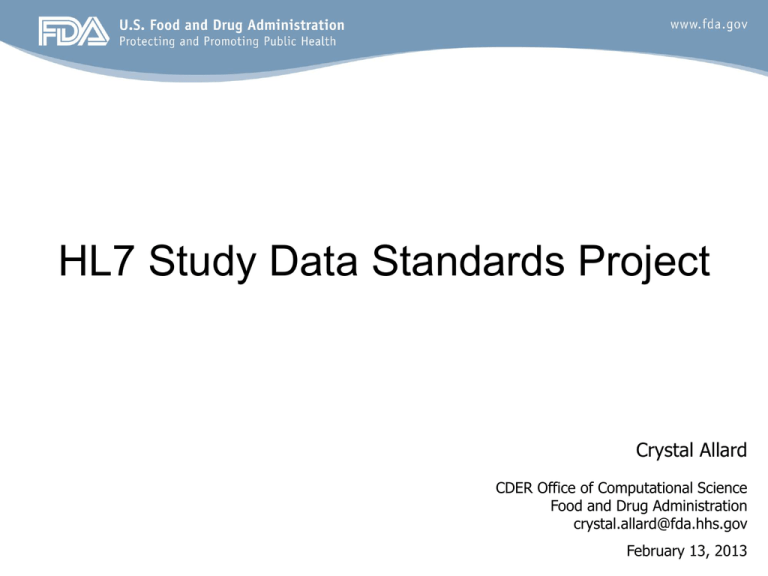
HL7 Study Data Standards Project Crystal Allard CDER Office of Computational Science Food and Drug Administration crystal.allard@fda.hhs.gov February 13, 2013 HL7 Study Data Standards Development Project • An FDA-sponsored project within HL7 to harmonize CDISC study data content standards with HL7 v3 exchange standards • FDA continues to hear from stakeholders that harmonization of standards across SDOs is important – This is one example HL7 Study Data Standards Project • Three related standards: – Study Design Structured Document (Protocol; what will be done?) – Study Participation (Who is involved?) – Subject Data Implementation Guide (I.G.) for CDA Release 2 (What was observed?) • All three designed to transport existing CDISC content and additional high-level FDA study information exchange requirements (captured as storyboards or scenarios) • All three support exchange of “round” hierarchical, multirelational data CDER’s Position on the HL7 Study Data Standards Project • This is a Data Standards Research and Development (R&D) Activity • No policy decisions have been made regarding adoption or implementation • Position statement posted publicly on fda.gov – http://www.fda.gov/Drugs/DevelopmentApprovalProcess/FormsSubmission Requirements/ElectronicSubmissions/ucm269946.htm CDER Position • Ongoing and increased CDER support for CDISC standards for study data content – 2004: SDTM – 2011: SEND • Currently, CDER supports the submission of CDISC content using SAS Transport File (XPT) v5 exchange format – Limitations of this file format, and desire to move away from this format • HL7 v3 XML exchange standard is a promising alternative to replace XPT v5. Proof of Concept • CDER conducting a proof of concept to test HL7 Study Data Standards (R&D activity) – In parallel with ongoing robust CDISC implementation efforts and Therapeutic Area (TA) standards development • Incremental Testing: – Phase 1: Patient Narrative / Clinical Investigator Info (1572) – Phase 2: Structured Protocol – Phase 3: Subject Data • Testing will include opportunity for interested stakeholders to participate – Open and transparent – Through HL7/RCRIM “Stage 2” project team • Bi-weekly meetings, Wednesday 11am ET • Crystal Allard, PM (crystal.allard@fda.hhs.gov) HL7 Study Data: Proof of Concept Phase 3 Subject Data Phase 2 Structured Protocol Phase 1 Patient Narratives Clinical Investigator (FDA Form 1572) today Phase 1: Current Status • FDA Form 1572 (Clinical Investigator Information) and related information – Testing Complete – Test Report Complete Feb 2013 – Operational Pilot Project being planned • Patient Narrative – Testing Nearly Done – Expect Test Report Q2 2013 Phase 2: Current Status • Study Protocol content, as defined by ICH E6 guideline and CDISC SDTM Trial Design domains • Testing initiated Sept 2012 – Draft Study Design S.D. Implementation Guide complete for clinical and nonclinical protocols; shared Nov 2012 with Stage 2 team for comment – Developed data entry tool, data visualization tool for testing – Expect completion of testing Q3 2013 Phase 2: Study Design Structured Document • Study Protocol content, as defined by ICH E6 guideline and CDISC SDTM Trial Design domains • “SPL” for Protocols • Testing initiated Sept 2012 – Draft Study Design S.D. Implementation Guide complete – Shared Nov 2012 with Stage II team for comment – Developed data entry tool, data visualization tool for testing (we will review today) – Expect completion of testing Q3 2013 High Level SDSD Test Plan • Develop Testing Tools (Done) • Conduct Testing (March-May 2013) – Volunteers create test files – Provide files to FDA – FDA reviews format/content • FDA will analyze the results – Test Report – Identify any changes to standard, I.G., vocabulary, xForm What happens after Testing? • • • • • Make needed changes to artifacts Normative SDSD ballot Finalize I.G. Operational Pilot Policy Decision: Implement Yes/No?? Phase 3: Current Status • Subject Data using CDA R2 • Testing not yet started • Draft CDA Implementation Guides for clinical (SDTM) and nonclinical (SEND) data complete; to be shared Nov 2012 with Stage 2 team for comment – Support for “round” multi-relational data – “Forward compatibility” – I.G. can accommodate new SDTM content as it is developed – I.G.s written using VA’s Model Driven Health Tool (MDHT): Conformance rules part of the I.G.
